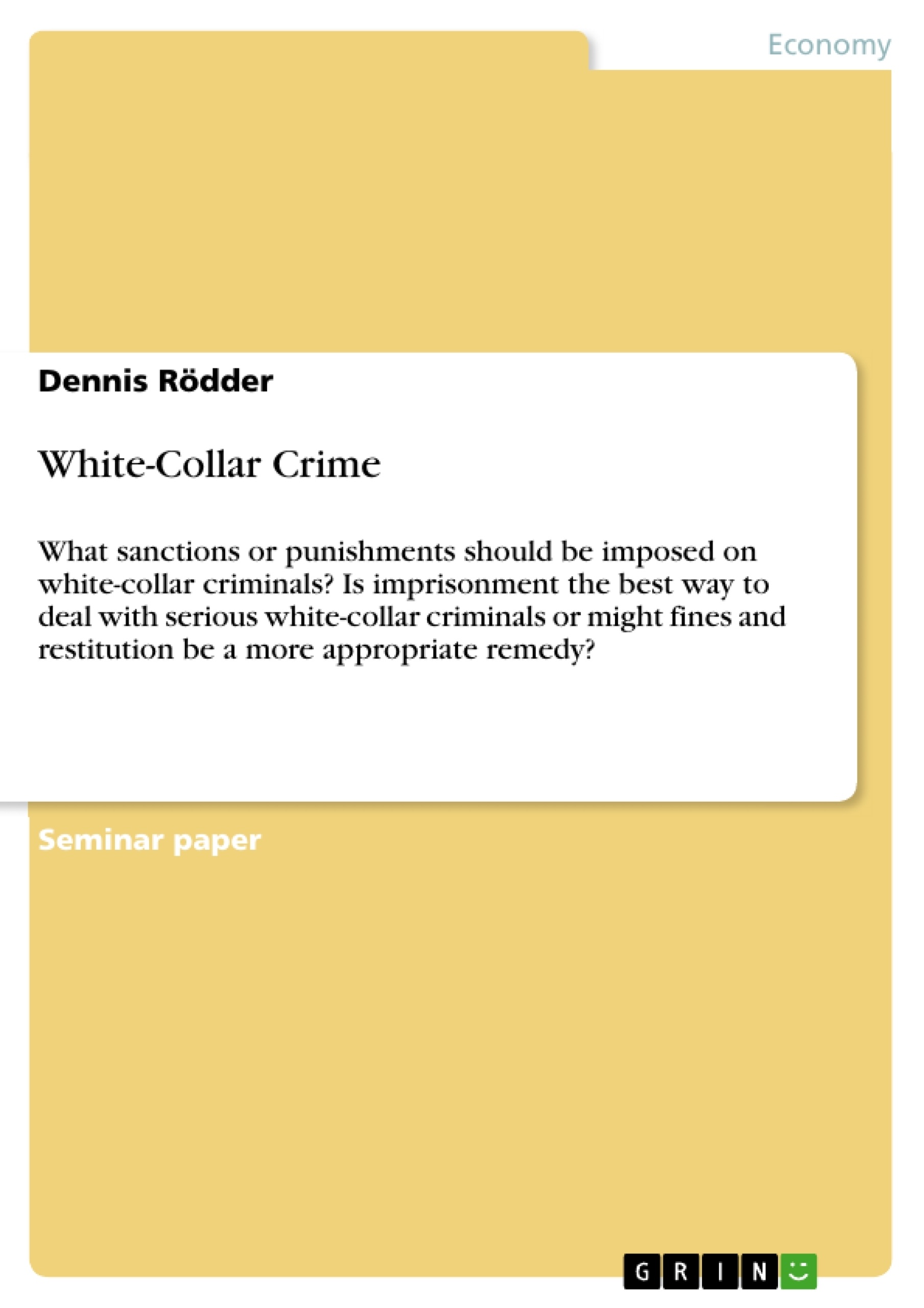Punishment “…is the authorized imposition of deprivations - of freedom or privacy or other goods to which the person otherwise has a right, or the imposition of special burdens - because the person has been found guilty of some criminal violation, typically (though not invariably) involving harm to the innocent”.
In order to explain what kind of punishment should be imposed on white-collar criminals we need to figure out the intentions of punishment and why punishment is necessary in the first place.
Inhaltsverzeichnis (Table of Contents)
- Introduction
- Definition of Punishment
- Applicable Law
- Different Types of White-Collar Crimes
- The Sense of Punishment
- Public Need for Punishment
- Retributivism (Absolute Theory of Punishment)
- Utilitarian Theory (Relative Theory of Punishment)
- Deterrence in the Narrow Sense (General Negative Deterrence)
- Consciousness of Law (General Positive Deterrence)
- Incapacitation (Specific Negative Deterrence)
- Rehabilitation (Specific Positive Deterrence)
- Combination Theory
- Types of Punishment
- Restitution/Compensation
- Asset Forfeiture
- Fines
- Imprisonment
- Public Notice of the Sentence
- Confiscation of Assets
- Occupational Ban
- Affidavit of Means
- Measures/Secondary Punishments
- Proposed Sentencing of White-Collar Criminals
- Facts to be Considered
- Basic Sentencing
- Extension for Recidivism and Aggravated Crimes
- Substitution for Impossible Sanctions
- Further Problems about Punishment of White-Collar Criminals
Zielsetzung und Themenschwerpunkte (Objectives and Key Themes)
This paper aims to analyze the different theories and philosophies surrounding punishment, specifically focusing on white-collar crimes. It examines the justifications for punishment, exploring both absolute and relative theories, and delves into various types of punishments including imprisonment, fines, and restitution. The paper also addresses the issue of specific sentencing for white-collar criminals, considering relevant facts and potential challenges in applying punishment.
- Theories and Justifications for Punishment
- Different Types of White-Collar Crimes
- Types and Application of Punishment
- Sentencing of White-Collar Criminals
- Challenges in Punishing White-Collar Criminals
Zusammenfassung der Kapitel (Chapter Summaries)
The introduction provides a definition of punishment and establishes the context for analyzing white-collar crime. It outlines the scope of the paper and emphasizes its focus on general principles rather than specific legal systems.
The second chapter explores the various theories behind the sense of punishment. It delves into the public need for punishment, the absolute theory of retribution, and the relative theory of utilitarianism. The chapter examines the different facets of deterrence, including general and specific deterrence, as well as positive and negative dimensions.
Chapter three presents an overview of various types of punishment, including restitution, asset forfeiture, fines, and imprisonment. It also discusses secondary punishments such as public notice, asset confiscation, occupational bans, and affidavits of means.
The fourth chapter focuses on proposing a sentencing framework for white-collar criminals. It outlines key factors to consider in determining appropriate sentences, discusses basic sentencing guidelines, and explores potential extensions for recidivism and aggravated crimes. It also addresses the issue of substituting sanctions when certain measures are impossible.
Schlüsselwörter (Keywords)
This paper examines key concepts related to white-collar crime, including punishment, deterrence, retribution, utilitarianism, restitution, asset forfeiture, fines, imprisonment, and sentencing. It explores the theoretical justifications for punishment and applies them to the specific context of white-collar crime. The paper also addresses the challenges and complexities of enforcing sanctions in this area.
Frequently Asked Questions
What is the definition of punishment in the context of white-collar crime?
Punishment is the authorized deprivation of rights or the imposition of special burdens because a person has been found guilty of a criminal violation.
What are the main theories of punishment?
The paper discusses Retributivism (absolute theory) and Utilitarianism (relative theory), including concepts of deterrence, incapacitation, and rehabilitation.
What types of punishments are applicable to white-collar criminals?
Common types include fines, asset forfeiture, restitution, imprisonment, occupational bans, and public notice of the sentence.
What is the difference between general and specific deterrence?
General deterrence aims to discourage the public from committing crimes, while specific deterrence targets the individual offender to prevent recidivism.
What factors should be considered in sentencing white-collar criminals?
The paper proposes looking at the severity of the harm, the intent, recidivism, and the possibility of substituting impossible sanctions with other measures.
- Citation du texte
- Cand. iur. oec. Dennis Rödder (Auteur), 2009, White-Collar Crime, Munich, GRIN Verlag, https://www.grin.com/document/138535



